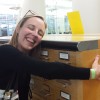Turning Outward to Lead Change in Your Community - ALA Summary
The ALA Annual Conference kicked off in a big way Friday evening with Roberta Kaplan speaking on the Supreme Court’s decision on the Obergefell vs. Hodges case regarding same-sex marriage. Kaplan referred to the Supreme Court’s decision on DOMA two years previously to the day with enthusiasm and pride. The opening session focused on the successes and trials of the LGBT population in our country. The openness and welcoming environment set the tone for the next several days of the conference.
Turning Outward to Lead Change in Your Community
This session focused on looking at community needs as a community member rather than a library employee. The session leader helped participants walk through conversations designed to identify the aspirations for the community as well as the challenges in reaching those aspirations focusing on topics such as employment levels, housing availability, transportation, and breaking down language barriers.
As our libraries transition to a community focus, it will be important to be aware of the broad definition of community as where people live, work, and play. Leading change in the community will start with understanding community members’ aspirations for that area and the challenges they face to reaching those aspirations.
Hosting Repair Events at Your Library
Session leader Peter Mui is the founder of Fixit Clinic, an organization committed to teaching people how to fix household items with the goal of reducing the impact on local landfills. The clinic focuses on using local volunteers who have knowledge and experience in repairing household items (electronics, fans, small appliances, toys, etc.) and guiding community members in the exploration of how their broken items work and how to (hopefully!) fix them. Partnering community resources (people) and library resources (how-to books and online resources) to reduce the impact of waste on the environment is an excellent example of a way to Satisfy Curiosity and Encourage Lifelong Learning.
Explore, Play and Imagine Interactive Tech Time in Kids' Library Programming
Session leaders from the Carnegie Library of Pittsburg discussed how they have introduced technology into children’s programming at their library. They discussed several iPad apps including Daisy the Dinosaur (an introduction to coding), Felt Board app (all the fun of felt boards without the cutting!), Make a Farmyard app, Toca Robot Lab, and Pete’s Robot (focus on STEM learning). Generally, the presenters focused on how iPads could add value through pictures, sounds, and video to story times when used by librarians. They also shared how they were introducing STEM topics to school age and younger children through iPad apps and the Bee Bot. Session leaders showed how creative use of technology can Satisfy Curiosity and Encourage Lifelong Learning, librarians can support and develop skills in Knowing How to Find, Evaluate & Use Information, and the library can provide access to current technology and digital resources as well as trained staff to help them use the resources effectively.
They’re Our Customers, Too: Engaging the Homeless at Your Library
Session leaders from Dallas Public Library, Denver Public Library, and Salt Lake Public Library discussed their processes of engaging and serving customers experiencing homelessness. They agreed that one of the first steps to engaging customers experiencing homelessness is helping staff to get to know the customers and building relationships with them (Visitors are welcomed into an atmosphere of hospitality, exemplary service, and friendly interaction). Each library helped to serve this customer base in different ways, but they all helped customers connect with community resources such as referrals to social services or bringing providers of social services into the library. Most referrals were handled by volunteers (through AmeriCorps or Volunteers of America) or by a professional working in the library (Denver’s Community Resource Specialist).
When session leaders surveyed their customers experiencing homelessness, they found there was a strong demand for hands-on programs during the day to keep them busy and intellectually engaged (The resources you need to explore topics of personal interest and continue to learn throughout your life are at your library). One survey by Dallas Public Library found that 80% of these customers had a college degree. Session leaders encouraged participants to get started by learning the facts and terminology about homelessness in their area. For more information about Homelessness in OKC, see the 2015 Point In Time Report by The Homeless Alliance.
Twenty-first century e-learning tools to train frontline employees
Providing consistent, relevant training for a large library system’s staff can be challenging. Denver Public Library discussed their use of three resources they found to be particularly useful to meet the demand: Screenr, Teleprompt app for iPad, and Adobe Connect. Screenr allows users to create 5 minute PowerPoint or Prezi presentations with voice-over to present small bits of information. Suggested uses were introducing administrative staff and their roles, how to enter leave requests, and an overview of the hiring process for supervisors. Teleprompt allows users who are less comfortable in front of a camera to write a script to read on the iPad while recording their video presentation. Adobe Connect allows users to conduct live and archived webinars at multiple sites. Presenters also referred to the benefits of having a YouTube channel for training videos. Libraries are finding creative ways to reach their employees to provide expert library staff with up-to-date knowledge, skills and abilities to deliver library services.
Library of the Future - Learning with Google's Daniel Russell
Daniel Russell talked about the future of reference and what it is currently possible to find through searching. The highlights of his presentation were:
- Teach customers how to use Ctrl-F to quickly find information on a webpage or other document!
- Google Maps can find the elevation profile of a path.
- Google Translate can now translate images from your phone camera.
- Go to the Google Images page and upload an image by clicking on the “camera” in the search bar to search for where photo was taken and what is in the photo.
- Power Searching with Google
- Practice your digital reference skills with A Google A Day.
- Use your browser’s Incognito Window to see all google results instead of the filters based on previous searches.
What I Stopped Doing: Improving Services by Giving Things Up
Libraries love programming! Unfortunately, there is a point where libraries need to evaluate how much quality programming they can sustain based on demand and available staff time. Tips to help refocus programming were:
- Be a facilitator, not an expert.
- Everyone serves teens, not just teen librarians.
- Library staff need to learn new skills.
- Refocus beyond traditional roles and measurements.
- Partner outside library walls.
I also brought back a number of ideas for programming supplies and tools from the vendor exhibits, visited the San Francisco Public Library – Main Branch, and toured the city! It was a great experience that I was happy to share with new and old friends!
- Log in to post comments





Comments
I love the idea of hosting a repair event! I've been mulling how to do one over in the back of my mind for quite a while.
Alexis,
I have more information from the session about the practical aspects. If you are interested, I can email them to you!
Risa I really like that you connected the ideas presented in the sessions you attended to our strategic plan plus included lots of links for us to pursue.
Fabulous write-up, Risa! Thanks for the notes from the Library of the Future session.